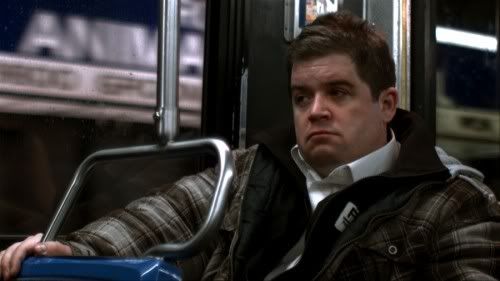In a fragmentary post rather some time ago, I described my aversion to heroic characters. In this series I'll be looking at some characters whom I do like.
Big Fan (2009) is the story of Paul Aufiero, a native of Staten Island and an aging man-child who still lives with his mother, and whose sole passion in life is New York Giants football. He is particularly enthusiastic about fictional Linebacker Quantrell Bishop. While working at his dead-end job as a parking attendant in New York, he passes his time by meticulously scripting his telephone rants for a late-night Sports Talk radio show (rather pathetically, Paul is forced to deliver these rants in hushed tone, so as not to disturb his mother in the next room). Paul has no girlfriend of whom to speak, and at no point in the film is he provided with even a passing romantic interest. His only real friend is Sal who, notwithstanding his Giants fandom, is rather a dullard. The life situation of Paul and Sal is quite perfectly encapsulated by a recurring shot of the two fans tailgating alone in the parking lot of Giants Stadium, watching the game on a portable television set powered by a car battery while everyone else in the stands, watching the game in person.
In sharp contrast is Paul's brother Jeff, an archetypal ambulance-chasing lawyer who owns a respectable house and has a wife and several children -- these being the hallmarks of a real life, according to Paul's mother, and also things which Paul insists he does not want. What Paul does want is not made clear, as it is probable that he himself does not know.
Paul's unremarkable takes a sudden turn when he follows Quantrell Bishop into an upscale Manhattan strip club: Bishop takes Paul for a stalker and beats the living tar out of him. Paul awakes from a coma three days later and discovers that Bishop has been suspended as a result of the incident, and may be charged with assault.Owing to Bishop's absence and the off-the-field-distraction, the Giants begin to perform increasingly poorly (a moment of realism in film, I might add). Although his family pushes him to file charges against Bishop, Paul's primary concern is that Bishop's continued absence could cause the Giants to miss the playoffs and he claims to have no memory of the incident.
Clearly, Paul Aufiero is no superhero. On the contrary, he is quite painfully average. Whereas characters like James Bond never lose, Paul Aufiero never wins. When Paul finally meets his hero, he gets an ass-kicking instead of an autograph. In spite of Paul's protests, his sleazy brother seizes upon his injuries as an opportunity to sue Quantrell Bishop for millions of dollars. His identity is exposed by a bellicose Eagles fan named Philadelphia Phil. Finally -- and perhaps most painfully of all -- Paul's mother embarrasses him on live radio when he calls his favorite Sports Talk show to make a statement about the incident.
Paul Aufiero is by most reasonable standards quite pathetic, a loser in the fullest sense of the word. Perhaps because of this, I cannot help but identify with him. Like Paul, I haven't many career aspirations of which to speak -- my job doesn't thrill me at all, and I too spend my down time scribbling my thoughts on a notepad. Like Paul, I cannot bring myself to want all the things one is supposed to want -- the high-profile job, the big house, the happy family. Like Paul, I find more meaning in trivialities like football -- or movies from the 20s and 30s, for that matter -- than most people would think reasonable. The world doesn't seem to have much use for people like us.
Big Fan captures quite well the reality of what it is to be wholly unremarkable, and it is precisely because its protagonist so unremarkable that I cannot help but see a little bit of myself in him.

No comments:
Post a Comment